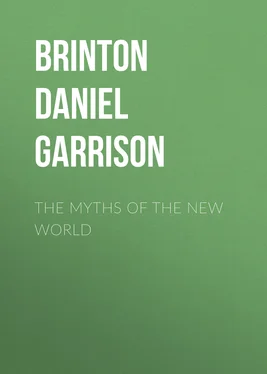Daniel Brinton - The Myths of the New World
Здесь есть возможность читать онлайн «Daniel Brinton - The Myths of the New World» — ознакомительный отрывок электронной книги совершенно бесплатно, а после прочтения отрывка купить полную версию. В некоторых случаях можно слушать аудио, скачать через торрент в формате fb2 и присутствует краткое содержание. Жанр: foreign_prose, История, Старинная литература, Мифы. Легенды. Эпос, foreign_edu, foreign_antique, на английском языке. Описание произведения, (предисловие) а так же отзывы посетителей доступны на портале библиотеки ЛибКат.
- Название:The Myths of the New World
- Автор:
- Жанр:
- Год:неизвестен
- ISBN:нет данных
- Рейтинг книги:5 / 5. Голосов: 1
-
Избранное:Добавить в избранное
- Отзывы:
-
Ваша оценка:
- 100
- 1
- 2
- 3
- 4
- 5
The Myths of the New World: краткое содержание, описание и аннотация
Предлагаем к чтению аннотацию, описание, краткое содержание или предисловие (зависит от того, что написал сам автор книги «The Myths of the New World»). Если вы не нашли необходимую информацию о книге — напишите в комментариях, мы постараемся отыскать её.
The Myths of the New World — читать онлайн ознакомительный отрывок
Ниже представлен текст книги, разбитый по страницам. Система сохранения места последней прочитанной страницы, позволяет с удобством читать онлайн бесплатно книгу «The Myths of the New World», без необходимости каждый раз заново искать на чём Вы остановились. Поставьте закладку, и сможете в любой момент перейти на страницу, на которой закончили чтение.
Интервал:
Закладка:
The Aztecs not only conquered a Maya colony, and founded the empire of the Quiches in Central America, a complete body of whose mythology has been brought to light in late years, but seem to have made a marked imprint on the Mayas themselves. These possessed, as has already been said, the peninsula of Yucatan. There is some reason to suppose they came thither originally from the Greater Antilles, and none to doubt but that the Huastecas who lived on the river Panuco and the Natchez of Louisiana were offshoots from them. Their language is radically distinct from that of the Aztecs, but their calendar and a portion of their mythology are common property. They seem an ancient race of mild manners and considerable polish. No American nation offers a more promising field for study. Their stone temples still bear testimony to their uncommon skill in the arts. A trustworthy tradition dates the close of the golden age of Yucatan a century anterior to its discovery by Europeans. Previously it had been one kingdom, under one ruler, and prolonged peace had fostered the growth of the fine arts; but when their capital Mayapan fell, internal dissensions ruined most of their cities.
No connection whatever has been shown between the civilization of North and South America. In the latter continent it was confined to two totally foreign tribes, the Muyscas, whose empire, called that of the Zacs, was in the neighborhood of Bogota, and the Peruvians, who in their two related divisions of Quichuas and Aymaras extended their language and race along the highlands of the Cordilleras from the equator to the thirtieth degree of south latitude. Lake Titicaca seems to have been the cradle of their civilization, offering another example how inland seas and well-watered plains favor the change from a hunting to an agricultural life. These four nations, the Aztecs, the Mayas, the Muyscas and the Peruvians, developed spontaneously and independently under the laws of human progress what civilization was found among the red race. They owed nothing to Asiatic or European teachers. The Incas it was long supposed spoke a language of their own, and this has been thought evidence of foreign extraction; but Wilhelm von Humboldt has shown conclusively that it was but a dialect of the common tongue of their country. 23 23 His opinion was founded on an analysis of fifteen words of the secret language of the Incas preserved in the Royal Commentaries of Garcilasso de la Vega. On examination, they all proved to be modified forms from the lengua general (Meyen, Ueber die Ureinwohner von Peru , p. 6). The Quichuas of Peru must not be confounded with the Quiches of Guatemala. Quiche is the name of a place, and means “many trees;” the derivation of Quichua is unknown. Muyscas means “men.” This nation also called themselves Chibchas.
When Columbus first touched the island of Cuba, he was regaled with horrible stories of one-eyed monsters who dwelt on the other islands, but plundered indiscriminately on every hand. These turned out to be the notorious Caribs, whose other name, Cannibals , has descended as a common noun to our language, expressive of one of their inhuman practices. They had at that time seized many of the Antilles, and had gained a foothold on the coast of Honduras and Darien, but pointed for their home to the mainland of South America. This they possessed along the whole northern shore, inland at least as far as the south bank of the Amazon, and west nearly to the Cordilleras. It is still an open question whether the Tupis and Guaranis who inhabit the vast region between the Amazon and the Pampas of Buenos Ayres are affined to them. The traveller D’Orbigny zealously maintains the affirmative, and there is certainly some analogy of language, but withal an inexplicable contrast of character. The latter were, and are, in the main, a peaceable, inoffensive, apathetic set, dull and unambitious, while the Caribs won a terrible renown as bold warriors, daring navigators, skilful in handicrafts; and their poisoned arrows, cruel and disgusting habits, and enterprise, rendered them a terror and a by-word for generations. 24 24 The significance of Carib is probably warrior. It may be the same word as Guarani, which also has this meaning. Tupi or Tupa is the name given the thunder, and can only be understood mythically.
Our information of the natives of the Pampas, Patagonia, and the Land of Fire, is too vague to permit their positive identification with the Araucanians of Chili; but there is much to render the view plausible. Certain physical peculiarities, a common unconquerable love of freedom, and a delight in war, bring them together, and at the same time place them both in strong contrast to their northern neighbors. 25 25 The Araucanians probably obtained their name from two Quichua words, ari auccan , yes! they fight; an idiom very expressive of their warlike character. They had had long and terrible wars with the Incas before the arrival of Pizarro.
There are many tribes whose affinities remain to be decided, especially on the Pacific coast. The lack of inland water communication, the difficult nature of the soil, and perhaps the greater antiquity of the population there, seem to have isolated and split up beyond recognition the indigenous families on that shore of the continent; while the great river systems and broad plains of the Atlantic slope facilitated migration and intercommunication, and thus preserved national distinctions over thousands of square leagues.
These natural features of the continent, compared with the actual distribution of languages, offer our only guides in forming an opinion as to the migrations of these various families in ancient times. Their traditions, take even the most cultivated, are confused, contradictory, and in great part manifestly fabulous. To construct from them by means of daring combinations and forced interpretations a connected account of the race during the centuries preceding Columbus were with the aid of a vivid fancy an easy matter, but would be quite unworthy the name of history. The most that can be said with certainty is that the general course of migrations in both Americas was from the high latitudes toward the tropics, and from the great western chain of mountains toward the east. No reasonable doubt exists but that the Athapascas, Algonkins, Iroquois, Apalachians, and Aztecs all migrated from the north and west to the regions they occupied. In South America, curiously enough, the direction is reversed. If the Caribs belong to the Tupi-Guaranay stem, and if the Quichuas belong to the Aymaras, as there is strong likelihood, 26 26 Since writing the text I have received the admirable work of Dr. von Martius, Beiträge zur Ethnographie und Sprachenkunde Amerika’s zumal Brasilians , Leipzig, 1867, in which I observe that that profound student considers that there is no doubt but that the Island Caribs, and the Galibis of the main land are descendants from the same stock as the Tupis and Guaranis.
then nine-tenths of the population of that vast continent wandered forth from the steppes and valleys at the head waters of the Rio de la Plata toward the Gulf of Mexico, where they came in collision with that other wave of migration surging down from high northern latitudes. For the banks of the river Paraguay and the steppes of the Bolivian Cordilleras are unquestionably the earliest traditional homes of both Tupis and Aymaras.
These movements took place not in large bodies under the stimulus of a settled purpose, but step by step, family by family, as the older hunting grounds became too thickly peopled. This fact hints unmistakably at the gray antiquity of the race. It were idle even to guess how great this must be, but it is possible to set limits to it in both directions. On the one hand, not a tittle of evidence is on record to carry the age of man in America beyond the present geological epoch. Dr. Lund examined in Brazil more than eight hundred caverns, out of which number only six contained human bones, and of these six only one had with the human bones those of animals now extinct. Even in that instance the original stratification had been disturbed, and probably the bones had been interred there. 27 27 Comptes Rendus , vol. xxi. p. 1368 sqq.
This is strong negative evidence. So in every other example where an unbiased and competent geologist has made the examination, the alleged discoveries of human remains in the older strata have proved erroneous.
Интервал:
Закладка:
Похожие книги на «The Myths of the New World»
Представляем Вашему вниманию похожие книги на «The Myths of the New World» списком для выбора. Мы отобрали схожую по названию и смыслу литературу в надежде предоставить читателям больше вариантов отыскать новые, интересные, ещё непрочитанные произведения.
Обсуждение, отзывы о книге «The Myths of the New World» и просто собственные мнения читателей. Оставьте ваши комментарии, напишите, что Вы думаете о произведении, его смысле или главных героях. Укажите что конкретно понравилось, а что нет, и почему Вы так считаете.












